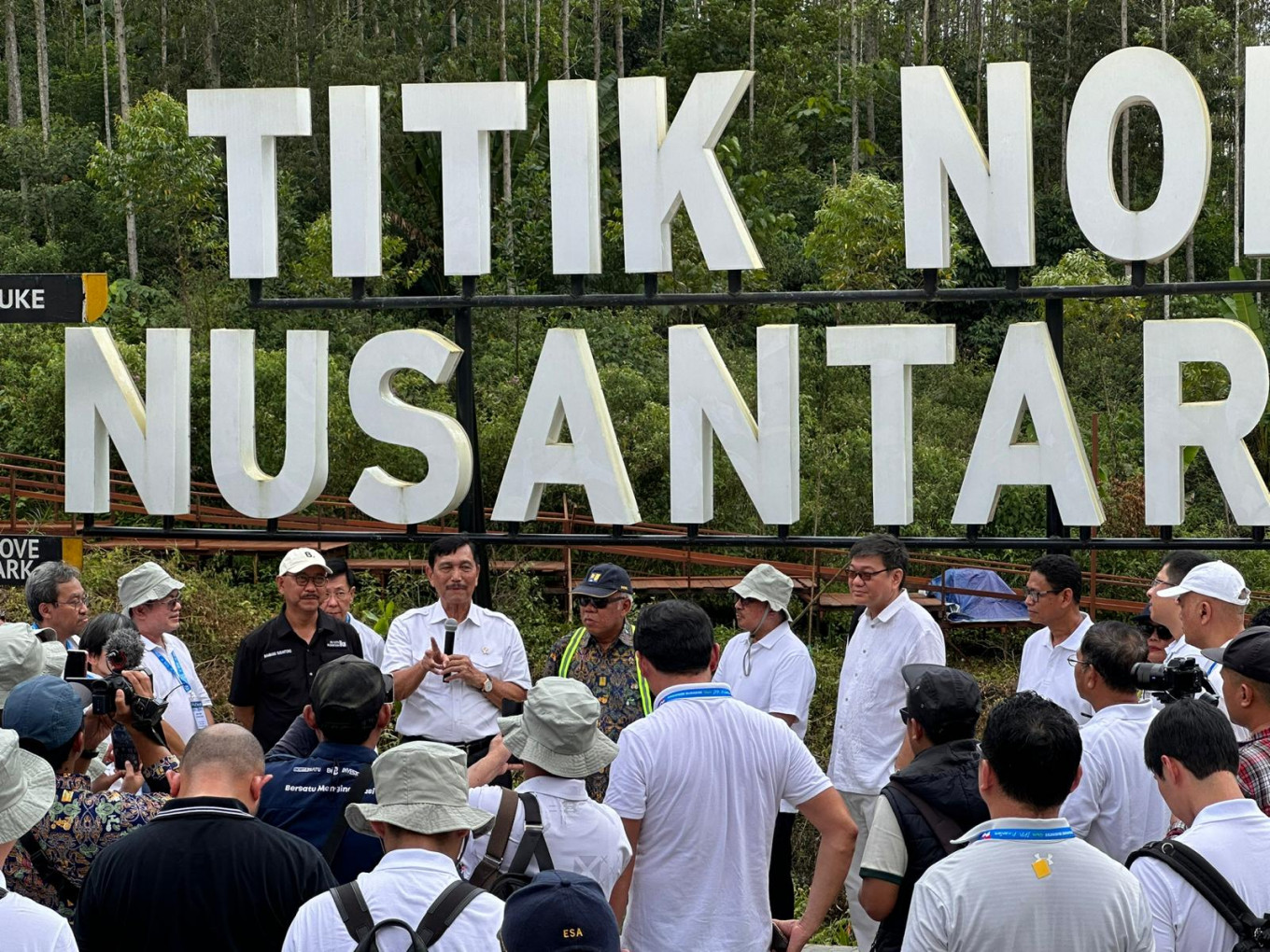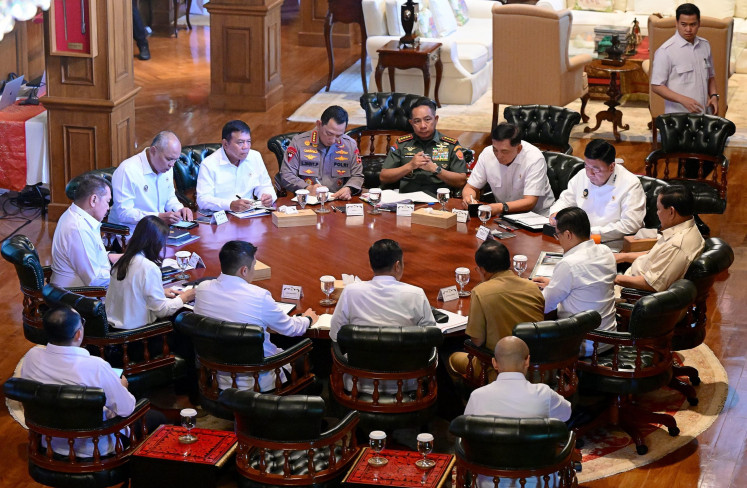Popular Reads
Top Results
Can't find what you're looking for?
View all search resultsPopular Reads
Top Results
Can't find what you're looking for?
View all search resultsReviewing national security in licensing foreign direct investment
Many believe the current FDI policies have resulted in foreign investors controlling a noteworthy portion of the nation’s strategic assets, especially in sectors such as energy and mineral resources, infrastructure and transportation.
Change text size
Gift Premium Articles
to Anyone
I
n recent years, Indonesia has introduced significant liberalization measures in an attempt to entice foreign direct investment (FDI) and spur economic growth. Two crucial initiatives in this regard are the implementation of the Online Single Submission (OSS) system and the New Investment List (more commonly known as the Negative Investment List).
With the OSS, the Office of the Coordinating Maritime Affairs and Investment Minister no longer reviews prospective investments. It focuses now on post-closing monitoring of foreign investment. As for the New Investment List, it has reduced by approximately 75 percent the businesses that formerly were fully or partially closed to foreigners, including important sectors such as infrastructure, mining and telecommunications.
While Indonesia hopes to increase FDI inflows, there are signs that require special attention to the potential effects on national security. FDI implementation in Indonesia in 2022 totaled about Rp 654.4 trillion (US$45.1 billion). This figure was 44.2 percent higher than the previous year’s realization. Most of the investment was poured into the sectors of metals, mining and real estate. Singapore, China, Hong Kong, Malaysia and the United States are the top-five countries of origin of the FDI.
Notwithstanding this new record high, there is a growing concern that the government is currently being too permissive with foreign investors. Many believe the current FDI policies have resulted in foreign investors controlling a noteworthy portion of the nation’s strategic assets, especially in sectors such as energy and mineral resources, infrastructure and transportation.
This public perception is somewhat understandable. We can use Indonesia’s nickel industry as one of the perfect examples. Nickel is a crucial component for electric vehicle (EV) batteries, making it one of the current most in-demand metal commodities in the world.
In 2021, an estimated total of 2.7 million tonnes of nickel was produced globally. Of that amount, 1 million tonnes, 37 percent, was produced in Indonesia. The government has thus far awarded about 148,228.97 hectares of nickel mining concessions, of which around 90 percent was given to foreign investors.
Many people are also concerned that Indonesia relies too heavily on foreign investors from a particular country, causing concern that certain foreign companies could attempt to control the nation’s critical infrastructure and technologies.
For example, China’s involvement in the construction of the new national capital city in East Kalimantan. The public presumes it is controlled mostly by Chinese investors. For instance, the government recently approved the establishment of a China-backed cement plant in the surrounding area of the planned capital. The approval raises questions given that Indonesia is currently facing oversupply in the cement industry.
The plan for relocating the national capital city has prompted loads of controversy from the start, especially because of the too-heavy dependence on foreign funding. People believe that the use of foreign funds will also mean disclosing strategic and sensitive information, such as the details of the spatial plan of the new capital city, to prospective investors. These circumstances certainly lead to national security threats.
In general, national security concerns about FDI revolve around the potential risks and vulnerabilities that foreign investments may pose to a country's economic, political and strategic interests. The most common one is a worry that foreign investors may gain significant control over strategic assets, such as critical infrastructure, industries, technologies or resources that are vital for national security.
Overreliance on a specific country or group of countries is another common national security concern. Excessive dependency on foreign capital may leave a country susceptible to economic influence, or potential disruptions if foreign investors decide to withdraw their investments.
Political influence is also a prevalent national security concern that is often linked to FDI. Large-scale foreign investments can influence domestic politics, policies or decision-making processes. There may be concerns about undue foreign influence on national decision-making, potential interference in domestic affairs or manipulation of political processes that could undermine national sovereignty.
Unlike the US and the European Union, Indonesia does not have an official means to screen foreign investments for their impact on national security. FDI in Indonesia is not screened on the grounds of national security risks.
The relevant regulatory frameworks only sort business activities into either high, medium or low-risk categories based on their impact on health, utilization or management of resources, safety and the environment.
This approach may lead to challenges in effectively gauging the consequences of an investment. It is crucial for the government to carefully consider the balance between encouraging investment and safeguarding national interests. The government's goal to increase investment is commendable, but it must not compromise the state's core principles in the process.
This absence of a government prerogative of intervention in FDI could potentially jeopardize national interests and security. Though the New Investment List sets restrictions on FDI in certain sectors, including those related to services in the context of strategic defense and security, a national security-related threat does not however have to always involve the arms industry.
When the relevant takeover affects the ability of the country to defend itself, it would be enough to be considered a peril.
One of the most famous examples was the rejection of the takeover of Unocal Corporation (a US company) by the China National Offshore Oil Corporation. The US government at the time was of the view that the takeover of a US energy firm by a foreign enterprise was enough to be a threat to national security.
Considering all the cases where the investment list has now been relaxed (including those related to strategic assets of the country) and the current policy where the investment ministry does not run prior reviews of proposed investment anymore, the need to create an FDI-screening mechanism on the grounds of national security risks becomes admissible.
A separate review mechanism will be a legitimate instrument for Indonesia to guard its safety, including if something happens to those strategic assets currently being controlled by foreign firms. It will also provide clear guidance and legal certainty for the investors, which will expectantly attract even more foreign entries.
The worries about how important a screening mechanism is would likely be eased if the New Investment List at least defined any national security concern or if the statute enumerated certain factors that the Indonesian government should consider in making a national security determination. However, that is not the case, the New Investment List does not even define any national security concern.
The main objective is to preserve a welcoming investment climate in Indonesia while enshrining a review instrument in the statutory framework. Heavy incursion is likely to result in protectionism, preventing the benefits of FDI from being realized. As a matter of recommendation, we may need to look at the national security review mechanisms that have been operated by the US and the EU.
Their tested review mechanisms and economic significance will arguably provide a reasonable model and provide a starting point for legal adoption for Indonesia. However, with the structural differences, Indonesia does not have to develop a drastic measure as operated in major economies such as those two jurisdictions.
We can tailor certain attributes of the review mechanisms to our specific context and national security priorities. By adopting certain attributes from established review mechanisms, Indonesia can benefit from international best practices while adapting them to suit its unique circumstances and requirements.
***
The writer is a legal practitioner, currently completing his master's degree in commercial and company law at Erasmus University Rotterdam.










